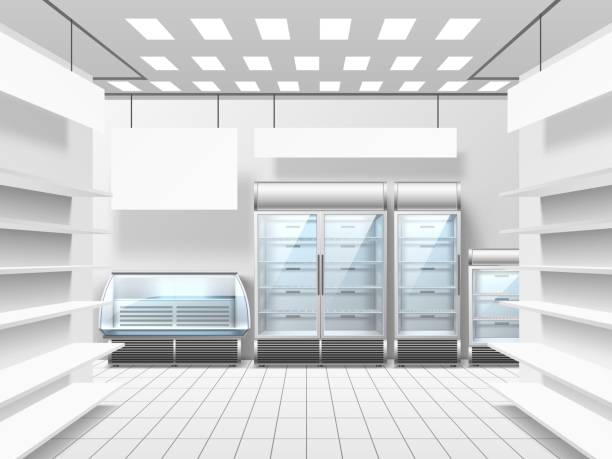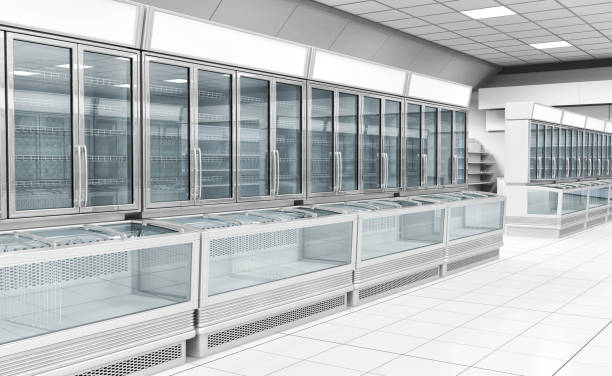Commercial refrigeration helps ensure food safety and freshness for customers. Choosing the right system involves considering various factors, such as storage capacity and energy efficiency.
Regular cleaning and maintenance of the condenser coils keeps refrigerators functioning well. Dirty coils force the compressor to work harder, which increases energy bills and could lead to more serious problems down the road.

Determine Your Needs
The size of refrigeration system that you need is determined by the volume of food or drinks that your business prepares. It also depends on how fast you go through stocks and the size of your property. It’s important to determine your needs to prevent investing in a refrigeration system that is too small or big for the property.
Moreover, the location of your compressor matters, especially for commercial restaurant refrigerators. Compressors can be mounted on the top or bottom of the unit, and each type works best in different environments. For instance, bottom-mounted compressors draw in cooler air and work well for hot spaces and kitchen areas. On the other hand, top-mounted compressors can be used in more open or colder environments.
You should also consider accessibility needs for the refrigerator. Do you want a fridge that is easy for the food preparation staff to reach in your restaurant? Do you need a freezer that can be easily accessed by customers at your grocery store or retail outlet? In addition, you should consider whether your business needs a refrigeration system that can be easily serviced by a commercial refrigeration Geelong
Finally, you should consider your energy efficiency goals for the refrigeration system. Energy-efficient refrigeration systems use less energy, thus cutting down your electricity bill in the long run. Moreover, they are environmentally responsible and can qualify you for tax breaks.
Space Requirements
The amount of cold storage you need plays a major role in the commercial refrigeration system that will best fit your business. This is based on the volume of food you need to store and how quickly you need it cooled. It’s also important to consider how your needs might change over time. For example, if you’re expanding your business, you may need more refrigerated space.
There are a wide variety of different styles of freezers and commercial refrigeration Melbourne on the market to meet the needs of businesses across many industries. The professionals will help determine which style of commercial refrigeration is right for your business. There are even specialty refrigeration systems designed to perfectly meet the needs of particular industries, such as bakery display cases, milk cases, sushi cases, glass chillers, and medical refrigerators.
Another consideration when choosing a refrigeration system is how energy-efficient it is. Refrigeration units that utilize energy-efficient compressors and smart temperature controls are more sustainable and can save businesses on energy costs, reduce emissions, and lower their environmental impact. They also allow businesses to preserve foods for longer, helping them cut down on waste and dependence on single-use plastics. This is an important part of any eco-friendly and sustainable business strategy.

Climate Requirements
If you operate a restaurant or bakery, your refrigeration system needs to be cold enough to keep food and ingredients fresh. You also need to protect yourself from spoiled items and inventory loss. You can prevent many issues by scheduling to regular maintenance and performing simple tasks like reducing condensation in the freezer.
Your refrigerators will have to work 24 hours a day, 365 days a year, which means they will consume a lot of energy. You can help reduce this burden on your business and the environment by choosing energy-efficient units. Look for the Energy Star badge to identify models that are around 40% more energy efficient than standard refrigerators.
The type of refrigerator you choose will also impact how much energy it uses. For instance, walk-in refrigerators are typically designed to accommodate a variety of foods and may feature sliding doors. These are great for larger kitchen spaces where you need to access ingredients easily and quickly.
You can also consider a commercial refrigerator with half doors to provide energy savings. The glass in these units is split down the middle, which helps to keep more cold air inside than warmer air.
You should also pay attention to the refrigerant used in your refrigerators. Freon was once the most popular refrigerant but it has been banned because of its link to ozone depletion and global climate change. Instead, new refrigerants with lower greenhouse gas profiles are taking their place. R290 hydrocarbon refrigerants are increasingly common and offer a safe, non-toxic alternative to fluorinated gases.
Energy Efficiency
Commercial refrigeration uses a lot of energy to maintain optimal temperatures for perishable food. This high energy consumption leads to high electricity bills, making it a major financial concern for businesses.
Energy efficiency is a key factor in sustainable commercial refrigeration. Traditional refrigeration systems use harmful refrigerants that contribute to global warming and depletion of the ozone layer, but energy-efficient models uphold product integrity and reduce environmental impact.
In addition to reducing energy consumption, energy efficient refrigeration systems are designed to last longer and require less maintenance. This helps businesses achieve cost savings and minimises the risk of costly breakdowns that can increase energy costs and disrupt business operations.
The best way to maximise energy efficiency in a commercial refrigeration system is to select an appliance with ENERGY STAR certification. These appliances meet strict energy efficiency guidelines and can help businesses save hundreds of dollars in electricity costs each year. Moreover, many utilities offer rebates on ENERGY STAR refrigerators that further lower the upfront investment.
Businesses should also consider the positioning of a refrigeration unit to maximise energy efficiency. Ideally, it should be located away from dust and debris that can clog the refrigeration mechanism and ensure adequate airflow. Regular cleaning and inspections also help minimise energy inefficiencies by ensuring that the refrigeration system is running properly and not overworking.